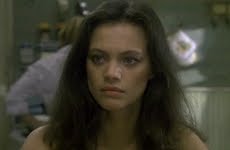 |
Alex Meraz as vicious inmate Nicaragua, the most watchable character.
I think he's one of the Twilight wolves.
|
.jpg) |
| Peruvian beauty Anahi de Cardenas. |
At a glance:
Camilo Vila's cool-soundin
186 Dollars To Freedom (2012), previously known as the less marketable
The City Of Gardens, is a U.S.-Peru effort by Four Fish Films that superficially explores the sociopolitical horrors of Third World South America. Based on the true story of the film's writer-producer, Monty
Fisher, we're clued in on a young blonde surfer livin happily with his beautiful girlfriend in
80s Lima, Peru, who naively lets his visa expire and finds himself behind
bars in the notorious El Sexto prison. When ruthless Peruvian
pigs discover the gringo in prison, they plant coke in
his backpack to extort money from him and his Beverly Hills family. Wayne
refuses to grease the wheels and quickly becomes a non-person, even to
his own Embassy. The movie purports to depict the grim system of corruption, torture, prison violence and
wholesale murder. Title is in reference to the precise amount he didn't wanna pay.
Bad news on the doorstep:
 |
John Robinson is the lead while Johnny Lewis plays a Hare Krishna follower.
There always seems to be one in every prison movie, huh. |
Iffy first words set us off on the wrong foot, but all the good camerawork and moody photography is undone by lead star John Robinson (Gus Van Sant's
Elephant) who seems to take the dramatic weight away from the movie because it's difficult to care for his naive character or his languid performance. This unremarkable approach would've worked in a documentary but not here. Supportin characters appear very staged due to the corny narrative.
 |
| Michael DeLorenzo plays bent cop Gutierrez. |
Perennial wonderment:
Village Voice writer Nick Pinkerton observes:
"If one were to base one's knowledge of South America
solely on the movies set there that make their way into theaters in
these United States, one could be forgiven for taking away the
impression that the continent's entire population is evenly divided
between unwashed prisoners and aviator-shade-wearing secret police, and
that its only industries are dilapidation and torture."
Reminds me of:
Mel Gibson's
Get The Gringo (2012), an infinitely more enjoyable movie.
Watch out for :
Anahi de Cardenas who plays the female lead is easy on the eyes but she doesn't get too much to do. There's also a run-out here for one-time sex siren Deborah Kara Unger. Sure looks like it's been ages since the time she got fresh with Michael Douglas in The Game (1997).
 |
| "Take him, he's got a tighter arsehole!" |
Amacam joker, berapa bintang lu mau kasi?
We definitely feel on location but the experience is not very emotionally rewardin. Oh well, at least it's not as pretentious as Oliver Stone's
Savages (2012). For more information, check out its
official website or its Facebook pages
new and
old. Me, I'd rather rewatch somethin like
Prison On Fire (1987) any day.
★★1/2
Bonus material:
Here's Monty Fisher's statement about his first-hand experience and how the movie came about.
+and+Alex+Meraz+(Nicaragua)+in+186+DOLLARS+TO+FREEDOM+1.jpg) |
| Alex Meraz and John Robinson in a brawl. |
"I was waiting for a plane flight back to the United States. I had just
escaped from the El Sexto prison in Lima, Peru and had secretly
journeyed by car, bus and on foot more than a thousand miles to cross
the border to freedom in Ecuador. I was exhausted by my ordeal, but I
had one last night to "enjoy" in Latin America. I decided to see a
movie. The movie was "Midnight Express", the true story about the
American who almost lost his mind and life in a Turkish prison. I left
the film shaking and in a trance. I could barely speak. Somehow, some
day I promised myself that night, that I also would tell my story about
my time in a Peruvian jail, and I too would show it on a big screen.
The next twenty eight years were a series of blunders, false starts
and deviations from the path. I became an actor (not so good), a
playwright (a little better) and a theater director (terrible) along
with my day job as a school teacher. I wrote 13 drafts of the story and
changed the title four times. I returned to Peru eight times to look for
a director to take on my screenplay. I even went to film school. It wasn't until I hooked up with Camilo Vila in 2008 that I saw any
real progress. He saw the raw potential in my story and worked with me
to craft a magnificent screenplay. I sensed that when we put this script with our casting director,
Pixie Monroe, that a lot of young guys would die for this role of a
young surfer who has to turn into a man in a Peruvian prison. We
received over 3,000 submissions, from which we chose John Robinson. We
had seen him in Elephant and Lords of Dogtown. He had sweetness and
vulnerability, and we liked that he insisted on doing his own surfing
stunts.
 |
| "Carne blanco!" |
Originally, our plan was to bring John to Peru and the rest of the
cast would be Peruvians. But when our script was being passed around
some of the Hollywood agencies, suddenly we had a lot of requests from
name actors, like Alex Meraz, Deborah Unger and Grant Bowler, all of
whom were willing to work for SAG minimum just for the chance to be part
of this film. Suddenly our little Peruvian film was becoming a big
Hollywood movie. April, 2010. We begin production and spend 29 grueling days in a
forbidding, condemned haunted old building, nicknamed "Siberia" for the
cold ocean fog that flows through it. Every American cast and crew
member got sick at least once. We had equipment and sound footage stolen
and kept hostage by local criminals. But we also had amazing luck. 2010
had been the coldest, cloudiest year in Lima in decades, yet on the one
day we were to shoot our beach scene, the sun miraculously came out. We
were also blessed by a cast of prison extras, who all had been real
prisoners, but who were now Born Again Christians. Their joyful and
grateful attitude carried us through the hard times of 14 hour a day
production.
 |
| Alex Meraz |
Editing the film was grueling too. Each new version we screened in
front of a different college film class. The response was tepid, at
best. We had to throw out a lot of our favorite scenes: a party, surfing
stunts, absurd prison scenes; all of this to be left with the remaining
raw story of a young guy who has to get out of prison, or die. Now we
saw that audiences were moved by the story. When we finally added the music, we knew we now had a great film. I
am really proud of our score composed by Roger Bellon. It's a unique
blend of ethnic, rock and opera that really pumps up the emotional
rollercoaster of this story. My most effusive thanks go to Camilo Vila. This film is the
embodiment of his vision. His patience with me, a first time producer is
near angelic. He has worked far beyond his contract to ensure that this
film is as magnificent as it is. He has been a loyal partner, and a
remarkable mentor to me. The final goal I have for this film, is to share it with Billy Hayes,
the American prisoner in the Turkish jail in "Midnight Express" whose
story would never leave me. I want to thank him for being the spur in my
heel that never let me give up this promise I made to myself back in
Guayaquil, Ecuador in 1980."



.jpg)


+and+Alex+Meraz+(Nicaragua)+in+186+DOLLARS+TO+FREEDOM+1.jpg)


![]()


























_010.jpg)



